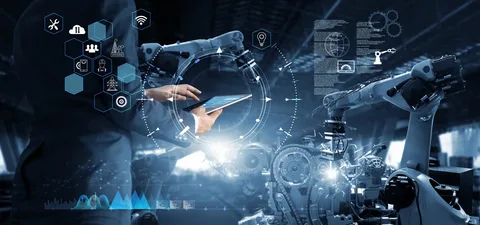Artificial Intelligence (AI) is not just a buzzword; it represents one of the most transformative technologies of the 21st century. From automating mundane tasks to enabling breakthrough innovations, AI is playing a pivotal role in reshaping industries globally, and India is no exception. As one of the largest IT hubs in the world, India’s AI ecosystem is expanding rapidly, driving the country toward becoming a global leader in AI research and development.
In 2024, AI is no longer a futuristic concept in India. It is integrated into everyday operations, from banking and healthcare to agriculture and education, accelerating the pace of digital transformation across the nation. As AI solutions continue to mature, India is positioned to leverage this technology to solve some of its most pressing challenges and to remain competitive on the global stage.
The AI Ecosystem in India
India’s AI ecosystem is backed by strong governmental initiatives, thriving IT firms, and a rich pool of technical talent. With over 1.5 million engineers graduating annually, the country has a massive workforce capable of driving AI research and innovation. The government, particularly through its NITI Aayog, has been working closely with tech giants and startups alike to promote AI-based solutions across various sectors.
The government’s “AI for All” strategy emphasizes responsible AI development while aiming to establish India as a global AI powerhouse. Through collaboration with international firms, research institutions, and startups, India is on the path to harnessing AI’s full potential. NITI Aayog’s initiative on “National AI Strategy” serves as a roadmap for leveraging AI in key sectors, including healthcare, agriculture, education, and urban infrastructure. Additionally, Indian institutions like IITs (Indian Institutes of Technology) have long been incubators of AI research, further solidifying the nation’s role in global AI advancements.
AI’s Role in Indian Healthcare
The healthcare sector in India has been one of the most fertile grounds for AI applications. With a vast and diverse population, many of whom reside in rural areas with limited access to healthcare, AI-powered solutions are helping bridge the gap between medical services and the underserved communities.
For instance, AI-based diagnostic tools are being developed to assist doctors in identifying diseases faster and more accurately. Startups like SigTuple and Niramai are creating AI algorithms that can analyze medical images to detect conditions like cancer and tuberculosis in their early stages. These tools offer a lifeline in a country where healthcare infrastructure is often stretched thin, especially in remote areas.
Moreover, AI chatbots and virtual health assistants are now commonplace in India. These tools guide patients through symptom checks and provide basic medical advice before referring them to a doctor. AI-powered mobile apps like “Arogya Setu,” developed during the COVID-19 pandemic, highlight the potential of AI in public health management, showcasing how AI can track the spread of disease and help individuals assess their health status.
AI in Agriculture: Enhancing Productivity and Sustainability
Agriculture remains the backbone of India’s economy, with over 50% of the population reliant on farming. AI is now emerging as a game-changer for the sector by offering solutions that can significantly improve productivity, reduce waste, and promote sustainable farming practices. AI tools, such as machine learning algorithms, are being used to predict weather patterns, analyze soil health, and optimize irrigation systems.
AI-enabled platforms such as Microsoft’s “AI Sowing App” provide Indian farmers with actionable insights to improve their yield. These platforms utilize data from satellite images, sensors, and weather forecasts to inform farmers when to sow seeds and which crops are likely to thrive in current conditions. The Indian government, along with private enterprises, is also exploring the use of drones and AI-powered robots for precision farming, reducing the need for manual labor while improving efficiency.
With India being a country heavily reliant on smallholder farmers, AI technologies can play a crucial role in transforming their productivity levels, thereby securing the country’s food supply and boosting the overall economy.
AI in Education: Bridging the Learning Divide
The education sector in India is another area where AI is making significant strides. India’s vast and diverse population faces numerous challenges when it comes to education, from overcrowded classrooms to a shortage of qualified teachers in rural areas. AI-driven EdTech platforms are helping bridge this gap by offering personalized learning experiences, allowing students to learn at their own pace.
Companies like BYJU’s and Vedantu have adopted AI algorithms to create adaptive learning platforms that cater to each student’s individual needs. These platforms track a student’s progress and offer customized learning paths, ensuring a more effective learning experience. Furthermore, AI is also being used to automate administrative tasks within schools and universities, freeing up educators to focus on teaching.
AI-powered tools such as virtual teaching assistants and automated grading systems are helping reduce the workload on teachers, allowing them to provide more targeted attention to students. Additionally, AI can identify areas where students are struggling and suggest resources or interventions to help them improve.
AI in Finance: Transforming India’s Banking and FinTech Landscape
In the financial services industry, AI is revolutionizing how banks and FinTech companies operate. AI technologies are helping Indian banks provide more personalized and efficient services while enhancing security and reducing operational costs. Chatbots and virtual assistants, like HDFC Bank’s EVA and ICICI Bank’s iPal, allow customers to resolve banking queries, make transactions, and access account information seamlessly, 24/7.
AI also plays a crucial role in fraud detection and risk management. By analyzing patterns in transaction data, AI algorithms can identify suspicious activity in real-time, helping banks and financial institutions prevent fraud before it occurs. This is especially important in a country like India, where the digitization of financial services has made cybersecurity a top priority.
The rise of FinTech startups in India has been another major catalyst for AI adoption in finance. Companies such as Paytm and Razorpay are integrating AI to streamline payment processes, provide instant loans, and assess credit risks. The use of AI in financial inclusion initiatives is also noteworthy, as AI helps assess the creditworthiness of individuals who do not have a formal credit history, enabling them to access banking services for the first time.
AI’s Role in Governance: Smart Cities and Public Services
AI’s integration into public services and governance is becoming increasingly visible, particularly in India’s ambitious Smart Cities Mission. The Indian government’s initiative to build 100 smart cities is heavily reliant on AI technologies to optimize urban infrastructure, manage resources efficiently, and improve the quality of life for citizens.
In smart cities like Pune and Hyderabad, AI is being deployed for traffic management, energy conservation, and waste management. AI-driven systems can monitor and control traffic lights to reduce congestion, while AI algorithms help optimize energy consumption in public buildings. Additionally, AI-powered surveillance systems improve urban security by detecting unusual activities in real time.
The deployment of AI in governance extends beyond smart cities. AI tools are being used to analyze large datasets, helping policymakers make informed decisions on issues such as resource allocation, healthcare access, and public safety. In rural areas, AI-based solutions are being used to digitize land records and streamline welfare disbursements, making public services more accessible to the underserved.
Challenges and Ethical Considerations in AI Adoption
Despite the numerous advantages AI offers, its adoption in India is not without challenges. One of the primary concerns is the potential for job displacement as AI-powered automation reduces the need for manual labor in certain industries. While AI has the potential to create new jobs, particularly in AI development and data analysis, the transition could be disruptive, especially for low-skilled workers.
Another concern is the ethical implications of AI, particularly in areas such as privacy and bias. AI systems often rely on large datasets, raising concerns about data privacy and security. Ensuring that AI algorithms do not reinforce existing societal biases is another challenge, especially in a diverse country like India.
The government and private sector must work together to develop robust AI policies that address these concerns. Efforts are being made to create guidelines for ethical AI development, with a focus on transparency, accountability, and inclusivity.
The Future of AI in India
As AI technologies continue to evolve, India stands at the cusp of a major technological revolution. With its large population, diverse economy, and thriving tech ecosystem, the country is uniquely positioned to harness the potential of AI. The integration of AI into various sectors will not only drive economic growth but also improve the quality of life for millions of Indians.
Looking ahead, the key to India’s success in AI lies in collaboration—between the government, industry, academia, and international partners. As the AI landscape continues to develop, India has the opportunity to lead the world in responsible AI innovation, setting a global standard for how technology can be used to solve real-world problems.










